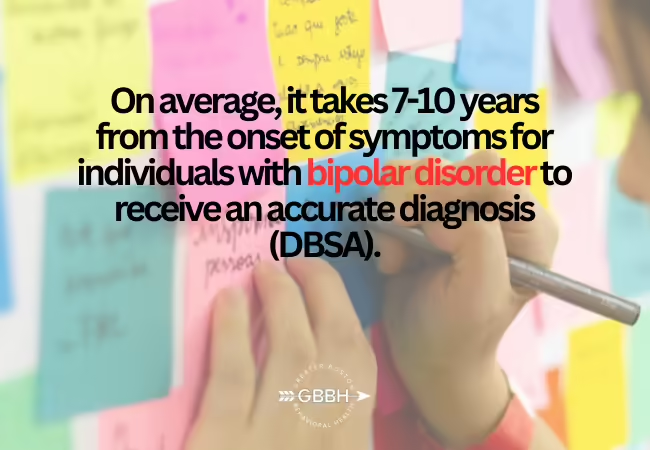Bipolar depression is a severe mental health condition that affects millions of people worldwide. As part of the broader bipolar disorder spectrum, bipolar depression is characterized by episodes of deep sadness and low energy, alternating with periods of mania or hypomania. Unlike unipolar depression, bipolar depression involves complex mood fluctuations, making it one of the most challenging mental health conditions to diagnose and treat effectively.
Bipolar depression is a condition that can be challenging to diagnose and treat effectively. It requires specialized care and a tailored approach to ensure individuals receive the support they need. Understanding the nuances of bipolar depression is critical to finding effective treatment and improving the quality of life for those affected.
The Complexities of Bipolar Depression Diagnosis
Diagnosing bipolar depression can be difficult due to the overlap of symptoms with other mental health conditions, particularly unipolar depression. During depressive episodes, individuals may experience profound sadness, fatigue, hopelessness, and difficulty concentrating—symptoms commonly seen in various mood disorders. However, what sets bipolar depression apart are the episodes of mania or hypomania that alternate with depressive periods.
Accurate diagnosis often involves a thorough psychiatric evaluation, personal and family medical history review, and close observation of mood patterns. Misdiagnosis can lead to ineffective treatment strategies, underscoring the importance of consulting a comprehensive mental health treatment center in Boston or elsewhere, where professionals are experienced in distinguishing bipolar depression from similar conditions.
Effective Treatments for Bipolar Depression
Bipolar depression requires a multifaceted approach to treatment that combines evidence-based therapies, medication management, and lifestyle changes. Many individuals benefit from structured mental health therapy programs that offer personalized strategies to address the unique challenges of this condition.
Therapies such as CBT therapy (Cognitive Behavioral Therapy) and DBT therapy (Dialectical Behavior Therapy) are particularly effective. CBT therapy helps individuals identify and reframe negative thought patterns that contribute to depressive episodes, while DBT therapy focuses on enhancing emotional regulation, distress tolerance, and interpersonal effectiveness. These therapeutic techniques empower individuals to better manage their symptoms and reduce the frequency and intensity of mood swings.
Medications such as mood stabilizers, antipsychotics, and antidepressants can also play a vital role in managing bipolar depression. However, medication must be prescribed and monitored carefully, as the wrong combination can trigger manic episodes or worsen depressive symptoms.
The Importance of Comprehensive Mental Health Treatment Programs
For those grappling with bipolar depression, holistic mental health treatment programs provide a well-rounded approach to healing. These programs integrate traditional therapies with complementary practices such as mindfulness, nutrition counseling, and exercise, promoting overall well-being. A supportive community and a safe space for self-expression can make a significant difference in recovery.
As a trusted mental health treatment center in Boston, Greater Boston Behavioral Health provides an empathetic and professional environment for those seeking help with bipolar depression. Their experienced team employs evidence-based therapies and holistic practices, guiding clients to uncover their strengths and build resilience.
Navigating the Emotional and Practical Challenges of Treatment
The journey to recovery from bipolar depression is not always linear. Many individuals face challenges such as stigma, self-doubt, and difficulties adhering to treatment plans. Mental health professionals play a crucial role in offering encouragement, fostering accountability, and helping clients navigate setbacks with compassion and care.
Structured depression treatment programs are particularly valuable in providing continuity of care and tailored solutions. These programs may include individual therapy, group sessions, and family counseling to address the multifaceted impact of bipolar depression. At Greater Boston Behavioral Health, clients are supported every step of the way, ensuring that their path to recovery is both effective and sustainable.
Symptoms of Bipolar Depression
Bipolar depression affects emotional, cognitive, and physical well-being, often making daily life a struggle. Recognizing the symptoms is crucial for seeking appropriate care.
Emotional Symptoms
- Persistent feelings of sadness, emptiness, or hopelessness.
- Irritability or restlessness during depressive episodes.
- A lack of motivation or interest in previously enjoyed activities.
Cognitive Symptoms
- Difficulty concentrating or making decisions.
- Racing, intrusive thoughts during depressive episodes.
- Suicidal ideation or thoughts of self-harm.
Physical Symptoms
- Significant changes in appetite or weight.
- Disrupted sleep patterns, such as insomnia or hypersomnia.
- Chronic fatigue, even with adequate rest.
Challenges in Diagnosing Bipolar Depression
Bipolar depression is often mistaken for unipolar depression (major depressive disorder) because its depressive episodes can appear similar. However, misdiagnosis can lead to ineffective treatment strategies that may worsen symptoms.
1. Overlapping Symptoms
- The symptoms of depressive episodes in both bipolar and unipolar depression include sadness, fatigue, and difficulty concentrating, making differentiation challenging.
2. Lack of Mania or Hypomania History
- If a patient has not experienced or reported manic or hypomanic episodes, clinicians may overlook the possibility of bipolar disorder.
3. Delayed Diagnosis
- Research indicates that it takes an average of 7-10 years from symptom onset to receive an accurate diagnosis of bipolar disorder. This delay can lead to prolonged suffering and inadequate treatment.
4. Mismanagement Risks
- Treating bipolar depression with antidepressants alone can trigger manic episodes or rapid cycling, underscoring the importance of a comprehensive treatment approach.
Effective Treatment Approaches for Bipolar Depression
Bipolar depression requires a multifaceted treatment plan tailored to each individual’s needs. Treatment focuses on stabilizing mood, alleviating depressive symptoms, and preventing future episodes.
1. Medication Management
Medication is a cornerstone of bipolar depression treatment, and combinations are often required to address both depressive and manic symptoms.
- Mood Stabilizers: Lithium is one of the most effective medications for managing bipolar disorder, reducing the frequency and severity of depressive and manic episodes.
- Atypical Antipsychotics: Medications such as quetiapine or lurasidone are FDA-approved for bipolar depression.
- Antidepressants (with caution): Used in combination with mood stabilizers to minimize the risk of inducing mania.
2. Psychotherapy Interventions
Therapy is an essential component of bipolar depression treatment, providing tools to manage symptoms, improve coping strategies, and foster emotional stability.
- Cognitive Behavioral Therapy (CBT):
- CBT helps individuals identify and change negative thought patterns contributing to depressive symptoms.
- It equips individuals with practical strategies to manage triggers and prevent episodes.
- Dialectical Behavior Therapy (DBT):
- DBT emphasizes emotional regulation, mindfulness, and interpersonal effectiveness.
- It is particularly effective for individuals experiencing intense emotional swings or impulsivity.
- Family-Focused Therapy (FFT):
- FFT involves family members in the treatment process to improve communication and reduce relational stress.
- It is beneficial in fostering a supportive home environment.
3. Structured Mental Health Programs
- Depression Treatment Programs: Focus on reducing the intensity of depressive episodes and improving quality of life.
- Mental Health Treatment Programs: Comprehensive care that addresses co-occurring conditions, such as anxiety or trauma.
- Intensive Outpatient Programs (IOPs): Provide regular therapy while allowing individuals to maintain daily responsibilities.
- Partial Hospitalization Programs (PHPs): Offer a higher level of care with daily therapy sessions and psychiatric monitoring.
Holistic and Lifestyle Support for Bipolar Depression
While medication and therapy are vital, holistic approaches enhance recovery and promote long-term well-being.
1. Healthy Lifestyle Practices
- Regular Exercise: Physical activity reduces stress and improves mood by releasing endorphins.
- Balanced Nutrition: A nutrient-rich diet supports brain health and stabilizes energy levels.
- Sleep Hygiene: Maintaining a consistent sleep schedule reduces mood instability.
2. Stress Management Techniques
- Mindfulness and Meditation: Promote emotional balance and reduce anxiety.
- Yoga and Relaxation: Help manage physical tension and improve mental clarity.
3. Building a Support Network
- Family Therapy Programs: Strengthen familial relationships and improve communication.
- Support Groups: Provide a sense of community and shared understanding with others managing bipolar depression.
Preventing Relapse and Managing Long-Term Recovery
Bipolar depression is a lifelong condition, but with proper management, individuals can lead stable, fulfilling lives. Preventing relapse involves proactive planning and consistent care.
1. Ongoing Professional Support
- Regular check-ins with mental health professionals ensure treatment plans remain effective and address any new challenges.
2. Personalized Crisis Plans
- Collaborate with a therapist to develop a plan that outlines steps to take during high-stress periods or early signs of mood shifts.
3. Focus on Early Intervention
- Recognizing warning signs of depression or mania allows for timely adjustments to treatment, preventing escalation.
Why Choose Greater Boston Behavioral Health
With a mission rooted in compassion and evidence-based care, the center provides personalized solutions to help individuals regain control over their mental health. The skilled team at Greater Boston Behavioral Health utilizes therapies such as CBT therapy, DBT therapy, and other innovative approaches to foster lasting change.
What sets Greater Boston Behavioral Health apart is its holistic philosophy. Beyond addressing symptoms, the center encourages clients to rediscover their unique strengths and break free from the stigma often associated with mental health challenges. Nestled in a serene environment, Greater Boston Behavioral Health therapeutic approach is designed to inspire resilience and personal growth.
Building a Brighter Future
Bipolar depression may present significant challenges, but with the right treatment and support, individuals can lead fulfilling lives. Seeking help from a reputable mental health treatment center in Boston is an essential first step in the journey toward recovery. Through structured depression treatment programs and innovative therapies like CBT therapy and DBT therapy, clients can learn to manage their condition and thrive.
At Greater Boston Behavioral Health, the path to well-being is as transformative as it is supportive. By fostering an empathetic community and emphasizing holistic healing, the center provides individuals with the tools they need to achieve comprehensive mental health. Whether navigating the complexities of diagnosis or embarking on a treatment plan, Greater Boston Behavioral Health stands as a beacon of hope for those facing bipolar depression.
How Greater Boston Behavioral Health Can Help
At Greater Boston Behavioral Health, we provide evidence-based, compassionate care tailored to individuals navigating bipolar depression. Our multidisciplinary approach combines medication, therapy, and holistic support to address the unique challenges of this condition.
Our Services Include:
- Depression Treatment Programs: Comprehensive care for managing depressive episodes.
- CBT and DBT Therapy: Proven strategies to enhance emotional regulation and resilience.
- Mental Health Treatment Programs: Holistic care addressing co-occurring mental health conditions.
- Family Therapy Programs: Strengthening relationships and fostering a supportive home environment.
- IOPs and PHPs: Structured, flexible programs for various levels of care.
Final Thoughts
Bipolar depression is a complex condition, but it is manageable with the right diagnosis, treatment, and support. Professional care, combined with a commitment to holistic wellness and a strong support network, creates the foundation for long-term recovery and stability.
If you or a loved one is struggling with bipolar depression, Greater Boston Behavioral Health is here to help. Contact us today at (888)278-0716 to learn more about our programs and take the first step toward healing and empowerment.
FAQs on Bipolar Depression
How is bipolar depression different from unipolar depression?
While both involve depressive episodes, bipolar depression is part of bipolar disorder and includes alternating periods of mania or hypomania, whereas unipolar depression does not.
What are common symptoms of bipolar depression?
Symptoms include:
- Persistent sadness or hopelessness.
- Fatigue or lack of energy.
- Changes in sleep or appetite.
- Difficulty concentrating or making decisions.
- Suicidal thoughts or behaviors.
How is bipolar depression diagnosed?
A mental health professional evaluates symptoms, personal history, and mood patterns. Identifying past manic or hypomanic episodes is crucial for distinguishing it from unipolar depression.
What treatments are effective for bipolar depression?
- Medication Management: Mood stabilizers, atypical antipsychotics, and antidepressants (with caution).
- Therapy: CBT, DBT, and family-focused therapy help manage symptoms and improve emotional regulation.
- Structured Programs: Intensive Outpatient Programs (IOPs) and Partial Hospitalization Programs (PHPs) provide comprehensive care.
What role does therapy play in managing bipolar depression?
Therapy helps individuals understand their condition, develop coping strategies, and manage triggers. CBT and DBT are especially effective for regulating emotions and preventing relapse.
Can bipolar depression be managed without medication?
While therapy and lifestyle changes are essential, medication is often necessary to stabilize mood and prevent severe episodes. Treatment plans are tailored to individual needs.


